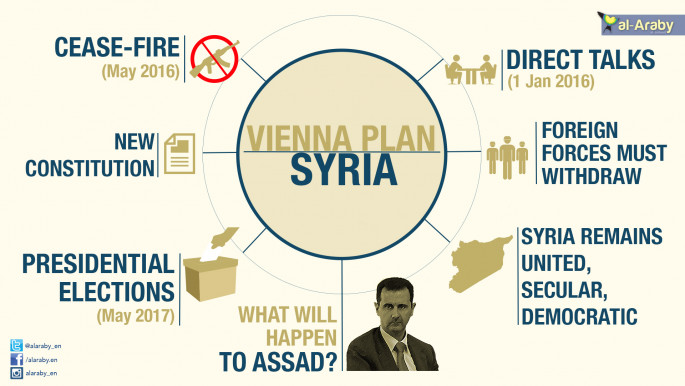Syrian opposition experts launch 'post-Assad roadmap' ahead of conference
A plan for political transition in Syria has been launched by a group of independent Syrian experts and opposition leaders to help pave the way towards ending the bloody conflict in Syria.
The plan is based on the Geneva Declaration in 2012 and UN Security Council resolution 2118, and comes ahead of a major Syrian opposition conference in Saudi Arabia to be held on December 11.
The plan contains a specific executive programme that would help achieve a transition into what the group called a new pluralistic and democratic Syria.
The roadmap, the text of which will be published Thursday by al-Araby al-Jadeed, responds to the need for a new initiative that captures the aspirations of the Syrian people, the Syrian Expert Group said, and could help bring an end to the crimes of both the regime and the Islamic State group (IS) in Syria.
The plan seeks to build a broad Syrian consensus, strengthen the role of Syrians in determining the future of their country and facilitate transition in accordance to the Geneva Communique.
The plan does not give President Bashar al-Assad any role in the transition.
The document was developed through several stages, al-Araby al-Jadeed has learned, after protracted consultations with various Syrian political and military figures and forces, including the key opposition Syrian National Coalition (SNC).
Drafts were debated at the Contemporary Syrian Studies Unit of the Arab Centre for Research and Policy Studies in Doha, in August this year.
The final text then incorporated the feedback and observations of various opposition forces.
Main points
The plan is two-pronged:
Logistics:
- A ceasefire is implemented as part of a comprehensive political settlement
- Armed groups and army forces withdraw outside cities and towns
- Foreign forces and militias withdraw from Syria
- Internal security forces are deployed after their leaders are replaced and their ranks supplemented from the opposition
- Detainees and prisoners are released by both sides
- Aid and relief is allowed to enter to all areas
- All terrorist groups are tackled along with their sources and supply lines.
 |
| [Click to enlarge] Read more:Vienna peace process: opportunities and challenges for Syrian opposition |
Politically, the plan includes establishing:
- A governing body with full executive powers to lead the transition, assisted by:
- Transitional government
- Transitional military council
- Transitional justice commissions
- National reconciliation commission
- Compensation and reparations commission
- Anti-corruption commission
- Provincial and municipal councils
These bodies would work to develop new electoral and political parties laws, hold elections for a constitutional assembly, help draft a new constitution and hold a constitutional referendum, and then hold legislative and presidential elections.
The plan also includes restructuring the armed forces, disarming militias, reforming the judiciary, restoring services and helping the displaced return home, ahead of reconstruction.
The group described the roadmap as a realistic solution that could guarantee the alternative to Assad "would not be chaos."
This is not the first time the Syrian opposition has attempted to put up a post-Assad programme, but with the Vienna peace process moving forward, the plan could be carried by the Syrian opposition after the Riyadh meeting to negotiations with the regime.





 Follow the Middle East's top stories in English at The New Arab on Google News
Follow the Middle East's top stories in English at The New Arab on Google News
![The UAE is widely suspected of arming the RSF militia [Getty]](/sites/default/files/styles/image_330x185/public/2024-11/GettyImages-472529908.jpg?h=69f2b9d0&itok=Yauw3YTG)
![Netanyahu furiously denounced the ICC [Getty]](/sites/default/files/styles/image_330x185/public/2024-11/GettyImages-2169352575.jpg?h=199d8c1f&itok=-vRiruf5)
![Both Hamas and the Palestinian Authority welcomed the ICC arrest warrants [Getty]](/sites/default/files/styles/image_330x185/public/2024-11/GettyImages-2178351173.jpg?h=199d8c1f&itok=TV858iVg)